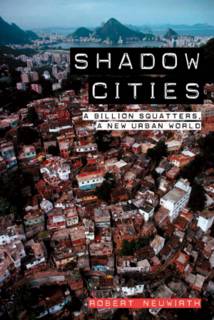Fundação dois Irmãos -- the Two Brothers Foundation -- is an excellent group promoting youth development in Rocinha, the largest favela in Rio de Janeiro.
Fundação dois Irmãos
Thursday, December 30, 2004
Monday, December 27, 2004
Thursday, December 23, 2004
improvement or gentrification?
An article from the Mumbai newspaper MidDay shows what real estate developers are planning for Dharavi, the city's largest squatter community. It's interesting that the reporter didn't talk with a single squatter.
MidDay
MidDay
I hope this will start a discussion
I think this reviewer misrepresents my argument, but I hope it may start a discussion about squatters rights
maisonneuve
maisonneuve
Publishers Weekly review
SHADOW CITIES: A Billion Squatters, a New Urban World
Robert Neuwirth. Routledge. ISBN 0-415-93319-6
In this superbly probing book, investigative reporter Neuwirth relates the struggles and successes of some of the world's most resourceful poor people, among the one billion urban squatters in countries likeBrazil India Kenya Turkey Rio de Janeiro Nairobi London New York
Robert Neuwirth. Routledge. ISBN 0-415-93319-6
In this superbly probing book, investigative reporter Neuwirth relates the struggles and successes of some of the world's most resourceful poor people, among the one billion urban squatters in countries like
Wednesday, December 22, 2004
squatters in South Africa
south africa
This article is from the Kenya Times, which in the past was the mouthpiece of the oppressive ruling party in Kenya. I haven't seen any coverage of this elsewhere. If the South African government is sincere, it will work with squatters to create local control over their land and redevelopment. If it simply ships squatters off to substandard and horribly maintained privately-owned buildings, then this is nothing but a land grab.
This article is from the Kenya Times, which in the past was the mouthpiece of the oppressive ruling party in Kenya. I haven't seen any coverage of this elsewhere. If the South African government is sincere, it will work with squatters to create local control over their land and redevelopment. If it simply ships squatters off to substandard and horribly maintained privately-owned buildings, then this is nothing but a land grab.
rocinha

a beco in Rocinha

here's a photo of a beco, or pedestrian path, in Rocinha, the largest favela in Rio de Janeiro
I like how the ingenious housebuilder simply cantilevered his home over the rock outcropping.
Becos are the way to travel around the favelas, because most don't have roads wide enough for cars. Amazingly, most of the more than 600 favelas in Rio have been improved so much over the years that the homes are like the ones pictured here: multi-story affairs made from poured concrete and brick.
shadow cities
Shadow Cities focuses on the lives and struggles of squatters in Brazil, Kenya, India, and Turkey, spanning centuries and cultures to make the case for these patriotic criminals, arguing that squatting is a venerable and legitimate form of urban development.
Shadow Cities is published by Routledge.
here's the amazon link:
Shadow Cities is published by Routledge.
here's the amazon link:
Shadow Cities
Subscribe to:
Posts (Atom)




